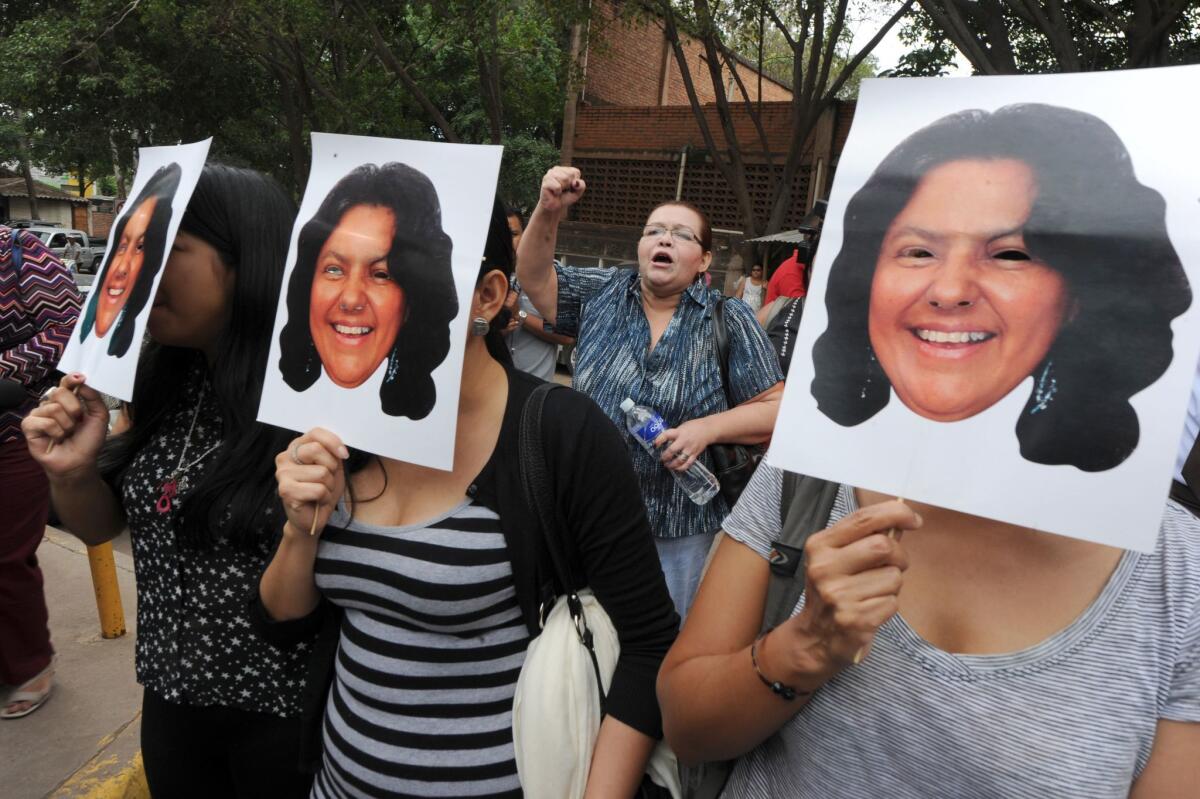Honduran environmental leader and rights activist Berta Caceres slain by assailants

Activists protest the killing of Honduras environmental and indigenous rights leader Berta Caceres on Thursday.
- Share via
Bogota, Colombia — Honduran human rights activist and environmental leader Berta Caceres had complained of death threats, and a prominent human rights organization had urged the government to provide her with protection.
But Caceres, who led a successful campaign against the construction of a Chinese-financed dam on indigenous lands and earned the prestigious 2015 Goldman Environmental Prize, was shot dead early Thursday when at least two assailants broke into her home in the town of La Esperanza, authorities said.
In awarding Caceres its prize last year, the Goldman committee cited Caceres for having “rallied the indigenous Lenca people of Honduras and waged a grassroots campaign that successfully pressured the world’s largest dam builder to pull out of the Agua Zarca Dam” project.
The dam project initially was proposed by Sinohydro, the Chinese government’s largest dam-building concern with more than 120 projects worldwide, including several in Latin America. After widespread protests, the Chinese pulled out of the project in 2013.
Caceres, 45, also had participated in protests by opponents to a proposed $50-billion canal in Nicaragua that is partially planned on indigenous reserves, said Monica Lopez Baltodano, director of Popol Na, a Nicaraguan women’s and peasants’ rights group in Managua.
In a telephone conversation last week with Caceres, Lopez Baltodano said Caceres told her she feared for her life and said that four leaders of her Lenca indigenous community had been slain in recent months.
“She mentioned the threats that had forced her to move her four children out of Honduras,” Lopez Baltodano said, adding that the human rights arm of the Organization of American States had called upon the Honduran government to protect Caceres.
Associates were quoted in local news reports Thursday saying there was no police guard at Caceres’ home at the time of her slaying.
“It’s a crime carried out by companies behind mining and hydroelectric projects illegally authorized by the state without the consent of indigenous communities. Berta struggled to protect those communities.” Lopez Baltodano said.
The Honduran project was to have included a reservoir built over a river considered sacred by the Lenca community.
In a statement, U.S. Sen. Patrick J. Leahy (D-Vt.) said Caceres’ death was a “great loss for the people of Honduras” and warned that the government’s inability to protect her would “weigh heavily” on future U.S. aid to the Central American country.
“Berta Caceres spent her life fighting for indigenous rights, and this horrific crime demonstrates that no one, not even an internationally known social activist, is safe in Honduras if they speak out against corruption or abuse of authority,” Leahy said.
The chief of staff for Honduran President Juan Orlando Hernandez called the killing an “abominable crime,” the Associated Press reported. Honduran human rights minister Karla Cueva said: “This crime cannot go unpunished.”
Caceres was a co-founder of National Council of Popular and Indigenous Organizations of Honduras, known by its Spanish initials COPINH. The group’s other co-founder, Tomas Garcia, was shot to death during a 2013 peaceful protest.
Other Sinohydro dam projects in the region include the controversial $2-billion Coca Coda Sinclair dam in Ecuador. Currently under construction, the dam will be Ecuador’s largest.
Caceres and other leaders feared the Honduran government was trying to revive the dam project. Last month, some 50 Lenca families were forcibly removed by police from their homes, according to the COPINH website.
Kraul is a special correspondent.
More to Read
Sign up for Essential California
The most important California stories and recommendations in your inbox every morning.
You may occasionally receive promotional content from the Los Angeles Times.










